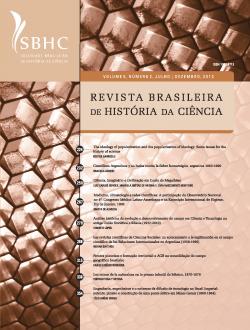Em busca do Brasil
Edgard Roquette-Pinto e o retrato antropológico brasileiro (1905-1935)
Keywords:
Edgard Roquette-Pinto, History of Physical Anthropology, Race, NationAbstract
This dissertation deals with the history of Physical Anthropology and discussions about race and nation at the beginning of the twentieth century, focusing on the anthropological studies carried out by the doctor and anthropologist Edgard Roquette-Pinto. As a scientist linked to the National Museum between 1905 and 1935, he dedicated his trajectory to researching the Anthropology and Ethnography of Brazil, through which he sought not only to describe the formative racial characteristics of the country, but also to evaluate the biological feasibility, psychological character and social conditions of the population. By linking Roquette-Pinto’s nationalist activism, his public actions and his dialogue with the anthropological thought of the time, the aim of the dissertation is to analyze the relations between Anthropology, nation and politics, emphasizing the national and international frontiers involved in the debate. As it will be demonstrated, Roquette-Pinto’s Anthropology was based both on a national context and Brazilian intellectual and scientific concerns, and the international debate on race and populations. On the one hand, the dissertation analyzes the interlocution and the controversies between the anthropologist and Brazilian writers, such as Euclides da Cunha, Manoel Bomfim, Oliveira Vianna, Renato Kehl and Gilberto Freyre, seeking to understand how controversies about racial miscegenation, immigration and the settlement of Brazil were central to the construction of interpretations, diagnostics and projects of national reform. On the other, it is also shown how his anthropological writing was constructed in dialogue with physical anthropologists, historians and foreign eugenists, mostly German and American, including Charles Davenport, Madison Grant, Eugen Fischer, Rüdiger Bilden and Franz Boas. One of the arguments defended in this dissertation is that the Anthropology of Roquette-Pinto becomes more intelligible when analyzing the international debate involving anthropological studies and intellectual networks. The dissertation is a contribution both for the History of Anthropology in Brazil and for the History of the circulation of ideas about race, national identity and population in an international context.
Downloads
Downloads
Published
Issue
Section
License

This work is licensed under a Creative Commons Attribution-NonCommercial-NoDerivatives 4.0 International License.















